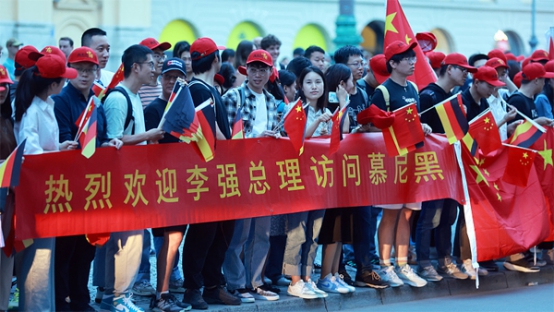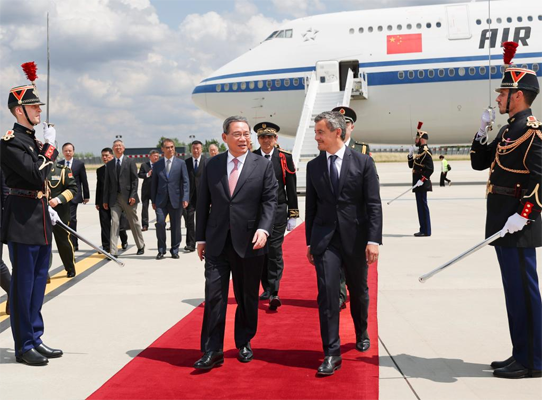SUN Yanhong: Injecting new impetus into practical cooperation between China and the EU

Chinese students wave Chinese and German national flags to welcome Chinese Premier Li Qiang's visit to Germany in Munich, Germany, June 20, 2023. /CFP
Editor's note: Sun Yanhong, a special commentator on current affairs for CGTN, is a Senior Research Fellow and Head of the Division of European Economic Studies at the Institute of European Studies (IES), Chinese Academy of Social Sciences (CASS). The article reflects the author's opinions and not necessarily those of CGTN.
From June 18 to 23, at the invitation of German Chancellor Olaf Scholz and the French government, Chinese Premier Li Qiang paid an official visit to Germany and France. Since the end of 2022, European leaders have visited China one after another. The high-level leaders' exchange visits between China and the EU have resumed rapidly after the interruption during the pandemic, and China-EU relations have also shown a significant sign of a rebound. In this context, Premier Li's visit is expected to inject new impetus into practical cooperation between China and the EU.
Germany and France are the first and second largest economies of the EU, serving as the "dual engines" for promoting European integration. Premier Li chose Germany and France for his first overseas visit after taking office, which indicates that China attaches high importance to China-EU relations and also reflects the strong desire of both sides to strengthen communication and cooperation.
In the past three years, influenced by factors such as the interruption of personnel exchanges during the pandemic and the dramatic changes in geopolitical situations, there have been voices within the EU of "getting rid of dependence on China" and shrinking cooperation with China based on values differences, which also have had influenced the EU's China policy.
In March this year, the President of the European Commission Ursula von der Leyen proposed the new concept of "de-risking" from China. In addition, the EU has also introduced a series of legislations and policies aimed at reducing economic dependence on China and strengthening economic competition with China. The implementation of these measures has had a certain negative impact on China-EU economic relations.
During his visit to Germany and France, Premier Li talked about the relationship between economic interdependence and risk on multiple occasions. He proposed that risk prevention and cooperation are not opposites and rejecting cooperation is the most significant risk.
Currently, the European economy is under significant downward pressure, and the Eurozone has fallen into a technical economic recession. China's economic recovery has also encountered many difficulties. In this context, strengthening practical cooperation between China and Europe is crucial for boosting their respective economies. The series of cooperation achievements reached during Premier Li's visit to Germany and France this time indicates that strengthening practical cooperation is fully in line with each other's interests. For both China and the EU, the benefits of cooperation far outweigh the risks.
During Premier Li's visit to Germany, the most noteworthy event is the seventh China-Germany inter-governmental consultation jointly chaired by the two prime ministers. There are many dialogue mechanisms between China and Germany, among which the inter-governmental consultation is the topmost-level one and the "super engine" to promote bilateral cooperation in various fields.
This year's consultation is the first face-to-face one in five years and its success released a positive signal, indicating that despite there are some noises in bilateral relations, the willingness of both China and Germany to engage in dialogue and cooperation is still very strong. By 2022, China has been Germany's largest trading partner for seven consecutive years, while Germany has been China's largest trading partner in Europe for 48 consecutive years. Practical cooperation has brought substantial benefits to the economic and social development of both sides. By maintaining their commitment to openness and pragmatism, China and Germany can foster bilateral cooperation, leading to mutual benefits and win-win outcomes across various domains.

Chinese Premier Li Qiang arrives at the Paris Orly Airport in Paris, France, June 21, 2023. /Xinhua
Premier Li's visit to France is not only a return visit to President Macron's visit to China this April but also aims at preparing for the celebration of the 60th anniversary of the establishment of diplomatic relations between China and France next year. During his visit, Premier Li attends the Summit for a New Global Financial Pact held in Paris. The summit is convened at the initiative of President Macron. Following the Paris Climate Conference held eight years ago, France once again gathers world leaders in Paris aiming at building a "new consensus" to meet the interlinked global targets of tackling poverty, curbing planet-heating emissions and protecting nature. This summit reflects the efforts of France in pursuing strategic autonomy for the EU, and is also a positive attempt by the European side to collaborate with China to jointly promote global governance reform.
This year marks the 20th anniversary of the establishment of a comprehensive strategic partnership between China and the EU. It can be foreseen that Premier Li's visit to Germany and France will play a positive demonstration role in promoting the relations between China and other EU member states, and therefore inject new impetus into the deepening of China-EU cooperation.
In addition, given their economic scales and international influences, China and the EU maintaining open and pragmatic cooperation will also help stabilize global supply chains, inject dynamics into the sluggish world economy, and add more certainty to the turbulent world.
Sun Yanhong, Senior Research Fellow at the Institute of European Studies, Chinese Academy of Social Sciences (CASS).
The article was originally published in CGTN on June 23, 2023.
